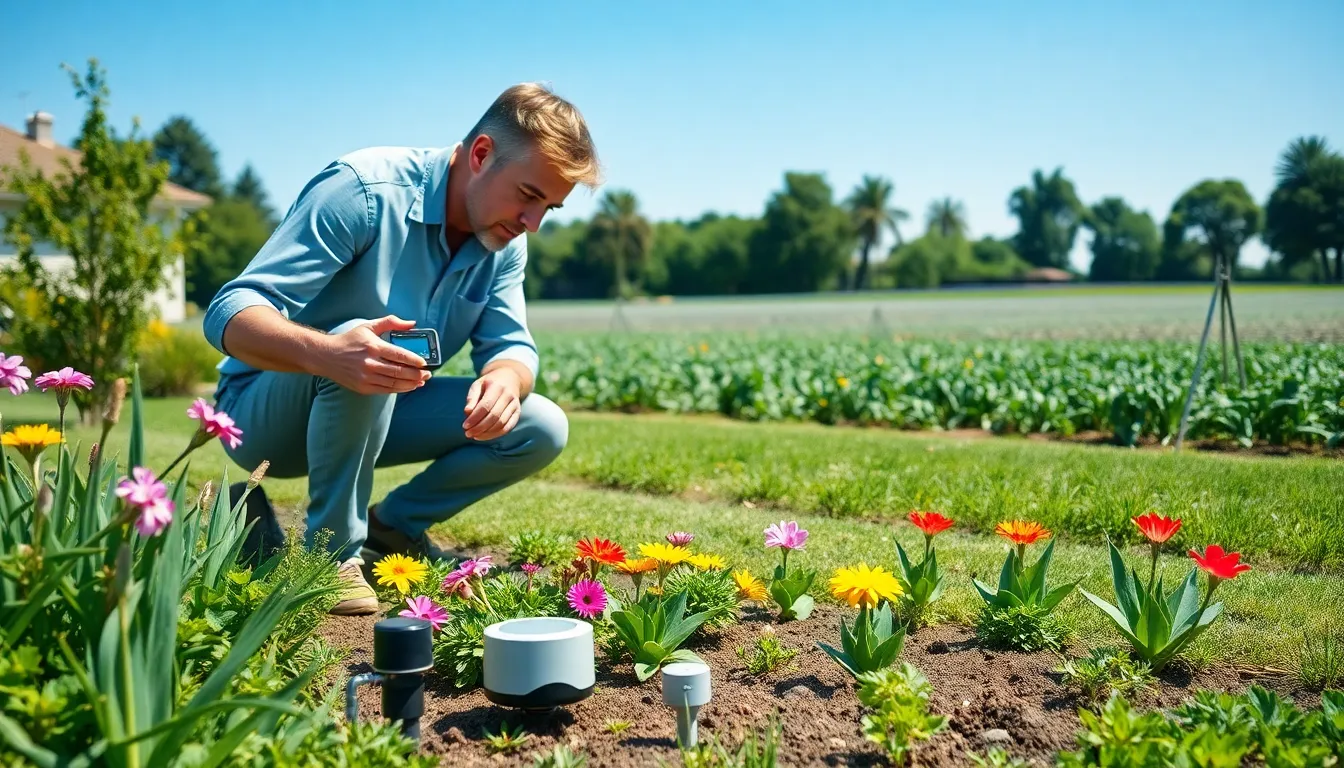Imagine a garden that waters itself, effortlessly turning your thumb greener than envy. Welcome to the dazzling world of smart irrigation. It’s a technological marvel that keeps your plants happy, saves you money, and maybe even makes your neighbor a tad jealous. Don’t worry, it’s not rocket science, or is it? Let’s jump into how smart irrigation systems are revolutionizing gardens and real estate, making life easier and greener, literally.
Table of Contents
ToggleUnderstanding Smart Irrigation Systems

Smart irrigation systems use advanced technology to optimize the watering of plants and landscapes. At their core, these systems consist of sensors, timers, and sometimes even weather data integration. Sensors placed in the soil measure moisture levels, ensuring that water is only delivered when it’s truly needed. This approach eliminates the guesswork and promotes healthier plant life. From small home gardens to large agricultural fields, these systems adapt to various requirements, providing efficiency and effectiveness that traditional irrigation methods simply cannot match.
Benefits of Smart Irrigation
The benefits of embracing smart irrigation technology are bountiful. First and foremost, efficiency is key. Traditional irrigation often leads to overwatering or underwatering, wasting water in the process. Smart systems, on the other hand, deliver just the right amount of agua to your plants, significantly reducing water waste. Also, this efficiency translates into savings on your utility bills. Homeowners and property developers alike can reap financial rewards, ensuring their investment in irrigation technology pays off.
Also, these systems also contribute to healthier plants. By providing precise watering schedules based on the specific needs of each plant, they help mitigate problems related to disease caused by excess moisture and promote root health. In a world where droughts and water shortages are becoming increasingly common, smart irrigation stands out as an eco-friendly solution that prioritizes sustainability.
Innovation in Smart Irrigation Technology
Innovation is the heart of smart irrigation technology. Gone are the days when one had to adjust systems manually or rely on haphazard methods. Today’s smart irrigation systems come equipped with state-of-the-art features like automated controllers and mobile app access. Homeowners can manage their irrigation systems from their smartphones, imagine sipping a coffee while adjusting your watering schedule from the comfort of your couch.
Some highly advanced systems even harness data analytics and artificial intelligence to learn from past watering behaviors, optimizing schedules for maximum efficacy. With the ability to integrate weather forecasts, these systems can adjust watering schedules proactively, preventing unnecessary use of water during rainy periods. It’s this innovation that makes smart irrigation a vital element in the conversation surrounding smart homes and sustainable living.
Integrating Smart Irrigation with Real Estate Development
In the realm of real estate development, smart irrigation is emerging as a vital consideration. With increasing awareness about sustainability among buyers, homes equipped with smart irrigation systems offer a competitive edge. Imagine a new community developed with these systems as standard features, appealing to eco-conscious buyers looking to reduce their water footprint.
Also, integrating smart irrigation technology can enhance the aesthetic appeal of properties. Well-maintained landscapes not only boost curb appeal but also increase property values. Developers can present these features as sustainability points, aligning with current market trends that emphasize green building practices and energy-efficient technologies.
Challenges and Considerations for Implementation
While the advantages of smart irrigation systems are plentiful, challenges remain. One primary hurdle is the upfront cost for installation, which can deter some homeowners and developers. Although the long-term savings often outweigh initial expenses, the initial investment can be a sticking point.
Also, the technical nature of these systems can be a barrier for less tech-savvy individuals. Setting up and troubleshooting smart irrigation systems may require a degree of comfort with technology that not everyone possesses. But, with proper education and support, many of these barriers can be overcome. Companies are increasingly offering training programs and customer support to assist users in enjoying the full benefits of smart irrigation.
Future Trends in Smart Irrigation Systems
The future of smart irrigation systems looks bright, like a well-watered plant basking in sunlight. As technology continues to evolve, we can expect to see even smarter systems emerge. For example, more integration with weather prediction technology will lead to systems that not only respond to soil moisture but also anticipated weather patterns.
Also, as water scarcity grows in importance on a global scale, we may witness an increase in regulations that enforce the use of smart irrigation systems in urban developments. With advancements in IoT (Internet of Things), future systems might also help better communication between irrigation systems, creating self-regulating networks that respond intelligently to environmental changes.
Summarizing, the future is ripe for smart irrigation growth, creating opportunities for innovations that benefit both people and the planet.





